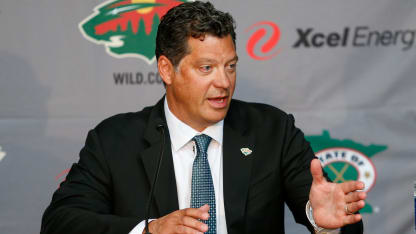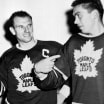Bill Guerin sometimes teases Scott Gomez about it.
Although many regard Gomez, an Anchorage, Alaska, native of Mexican-Colombian descent who debuted with the New Jersey Devils in 1999, as the first Hispanic star in the NHL, he wasn't the League's first player of Hispanic descent.
That distinction belongs to Guerin, a native of Worcester, Massachusetts, whose mother Ligia (maiden name Delgadillo) was born and grew up in Nicaragua and whose father, Bill, was Irish-American. The No. 5 pick by New Jersey in the 1989 NHL Draft, Guerin beat Gomez to the NHL by more than seven years when he made his NHL debut with the Devils on Feb. 20, 1992 against the Chicago Blackhawks at Chicago Stadium.
"We always laugh about that," Guerin said. "It's funny. [Gomez] has become a very good friend. We laugh about that all the time."
Now the general manager of Minnesota Wild, Guerin wasn't aware he broke a barrier at the time.
"Someone told me that years ago. I guess I didn't realize it," Guerin said. "It's something I'm really proud of and I'm glad to see there are other guys now. When I was playing, there was Raffi Torres and Gomez, and now you've got Auston Matthews and Evan Rodrigues and other guys. It's awesome to see."
Guerin scored 856 points (429 goals, 427 assists) in 1,263 games over 18 NHL seasons with the Devils, Edmonton Oilers, Boston Bruins, Dallas Stars, St. Louis Blues, San Jose Sharks, New York Islanders and Pittsburgh Penguins before retiring in 2010. He won the Stanley Cup with the Devils in 1995 and the Penguins in 2009 as a player and as assistant general manager with Pittsburgh in 2016 and 2017.
A 2013 inductee into the USA Hockey Hall of Fame, Guerin helped the United States win the 1996 World Cup of Hockey and represented the country at the 2004 World Cup of Hockey, the 1998 Nagano Olympics, 2002 Salt Lake City Olympics and 2006 Torino Olympics.
Guerin, who turns 50 on Nov. 9, became the first general manager of Hispanic descent in the NHL when he was hired by the Wild on Aug. 21, 2019. But he acknowledges that few know about his Nicaraguan heritage.
"I look a lot like my dad," he said.
Guerin's father made sure he didn't forget his where his mother came from when he was growing up, though.
"My dad actually had a Nicaragua patch sewn on my hockey jacket," Guerin said, laughing. "I wasn't too thrilled with that part because I had my hat trick patches and my playmaker patches and then there's a big Nicaragua patch. I was the only guy with that, for sure."
Here are Five Questions with … Bill Guerin:
Was your Nicaraguan heritage part of your life when you were growing up?
"It definitely was. Every other year when I was younger, we'd go down to Nicaragua and visit family and it was always fun. I have great memories of it. Then, when things got real uneasy down there with their war (in the early 1980s), it stopped us from going down for a long time. The last time I went I was probably 10 or 12.
"Somebody recently asked me, 'When your family got together what was it like?' and I just said whenever we were with extended family, if we were in Worcester, we were with Worcester [family]. And when we went down to Miami to visit family and things like that, that whole half of the family was Nicaraguan. I didn't understand what was going on because I don't speak Spanish, but it was a blast. We always had fun together."
How evident was the Nicaraguan culture in your childhood home?
"My mom would make some Hispanic food like fried plantains and things like that, but not on a regular basis. It was very evident, but if I didn't say anything you wouldn't know. But if you would come into our house, there were definitely signs. There were items all over the house, photos and things my parents brought back from Nicaragua.
"It was really important to my dad. Obviously, he loved my mom and he thought that it was a part of our family we needed to celebrate. Obviously, she did, too. But with my dad during the 1980s, if anything about Nicaragua was on the news, the whole household would have to be quiet and come in and watch it on TV to know that was going on."
Did your mom speak Spanish around the house?
"It's her first language. My sister (Melissa) stuck with it. I could get by if I needed to, but I didn't pursue it when I was a kid. I was average in the classroom and I never spent time really anywhere to develop anything like that. I wish I had. My sister's husband, my brother-in-law (Gonzalo Escajadillo) is from Peru, so my nieces and nephews they're all bilingual. My daughter Grace is bilingual."
You mentioned Toronto Maple Leafs center Auston Matthews, whose mother is from Mexico, and some other current Hispanic players. Are you hopeful that others will follow in their footsteps and help grow the game?
"To have one of the best players in our game who is half Mexican, that's totally huge. He's a player kids can look up to and there's a definitely a lot of potential. … Any time you can bring awareness to a different group, it's really important. It's new fans. You can open the game up to new fans and new players and all sorts of things. So, I think it's incredibly important."
Wild defenseman Mathew Dumba, who is Filipino-Canadian, made a speech about standing up for justice and against racism before the game between Edmonton Oilers and Chicago Blackhawks at Rogers Place in Edmonton on Aug. 1. What have you thought of the leadership role he's taken in the fight against racism and his fundraising efforts to help the community heal following the killing of George Floyd, a Black man who died while in custody of the Minneapolis police on May 25?
"Matt's been a leader in this movement. He's somebody young kids could look up to. In Minnesota with the Wild, we're very proud of Matt and the courage that it's taken for him to be an outspoken leader. … That [speech] took a lot of courage. You're a 26-year-old kid on the main stage of this big movement and Matt's just a positive kid. He's a very likeable guy. He always has a positive message.
"He's just determined and he's always thinking about the younger generation and how he can make it better for them, and I think that's awesome."


















